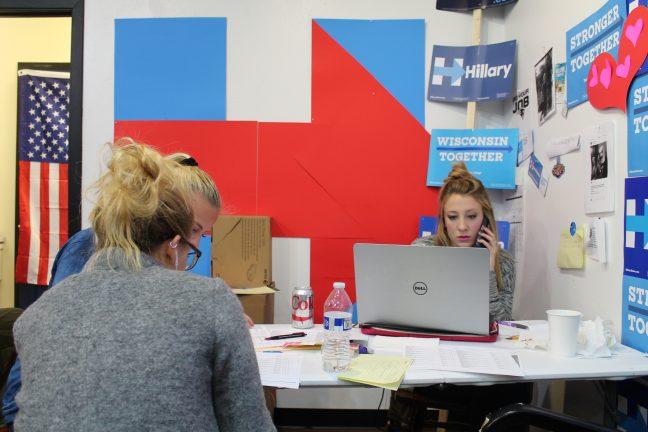Following the election of President-elect Donald Trump, protests, petitions and political activity erupted in cities and college campuses around the country that expressed dismay at the the nation’s choice of the controversial Republican businessman for the White House.
But despite the defeat of Hillary Clinton, who many predicted would become the first female president, Emerge Wisconsin — a training program aimed at preparing Democratic female legislators for political life — saw an unexpected spike in applications after election day.
After election night, Erin Forrest, executive director at Emerge Wisconsin, was worried the results would have a discouraging effect on women wanting to run for political office.
“I was not in a great place after election night,” Forrest said.
But in a few days, Forrest started seeing more applications come in for her program.
Since the application period opened in September, the program received 100 applications total. Sixty of those applications were received after Nov. 8, with 18 of them coming in within the first two days after the election.
Calling the rise in applications motivating and inspiring, Forrest said she was filled with hope.
“Those women made the decision that they weren’t happy with what happened, and they felt like they can be empowered to do something about it,” Forrest said. “Their response wasn’t ‘I want nothing to do with this,’ it was ‘We need more people to get elected, and I can be one of those people.'”
Some notable alumnae from the program are Rep. Melissa Sargent, D-Madison, Rep. JoCasta Zamarripa, D-Milwaukee, Dane County Supervisor Jenni Dye, District 33 and University of Wisconsin alumna and former College Democrat, Dane County Supervisor Hayley Young, District 5.
Local leaders reaffirm commitment to community in light of Trump’s election
Participants in the six-month long program meet one weekend each month to partake in various trainings ranging from public speaking and communication to fundraising and campaign strategy.
The program is designed to let the group bond, become cohesive and explore why they want to run for office, Forrest said.
Particularly for women, it is important to have a support network of fellow women when running for office, Forrest said. It’s not that women are less capable to run for office, Forrest said, but it is how society is structured that requires them to have that extra help.
“Women are still responsible for emotional labor in life like taking care of kids and aging parents, so they are much less likely to self select to run for office,” Forrest said.
Economics expert says changes in marriage dynamics promote job opportunities for women
This significant gap in political ambition between men and women starts as early as the high school level, Forrest added.
In a 2013 study “Girls Just Wanna Not Run,” 37 percent of female college-aged students considered running for political office compared to the 57 percent of their male counterparts.
Women often need to be asked by their peers and neighbors to run for office, UW junior Clara Hoff said.
Despite what she called “disappointing” results, Hoff, who also serves as vice-chair for College Democrats, believes more women will be willing to take that next step in running for office.
“After the results, we all needed to take time for ourselves — but we understand that our work has to continue,” Hoff said. “We saw a lot more people showing interest in the political process in the election.”
In the same vein, UW sophomore and College Democrats press secretary Eliana Locke received messages of support and inquiries of how to get more involved after the election. For her, while the election loss was like no other, it also presented a hopeful moment where people can start to work toward serious change.
The biggest change men and women can make in the future, is working to battle the misogyny and sexism that is “prevalent in our society” and has crept into the campaign trails for female candidates, Locke said.
Panel explores power, gender in politics before presidential election
With women making up a little over 50 percent of the population, but only 20.1 percent of Congress, Locke said women can bring in a a unique perspective on certain issues, such as reproductive health.
“We need more programs like Emerge Wisconsin because the way the system of campaigning is set up, is systematically set up to favor men,” Locke said. “Since we’ve had more men candidates than women, people are programmed to see men as the more correct version.”
While Locke said programs like Emerge Wisconsin are not going to fix people’s implicit biases against women running for office overnight, it will provide them the skills to fit with people’s perceptions and see them as viable candidates.
Website listing female political science experts aims to address implicit biases
With more applicants, Forrest said the program is looking at ways to craft additional programing to meet all the needs of the women who applied after seeing the election results.
While there will be no dramatic shifts for the program in the foreseeable future, Forrest said they will work to find answers to the ever-evolving political landscape as they move along.
“Part of the answer is building the future we want and building a government that looks like the people it represents,” Forrest said.


